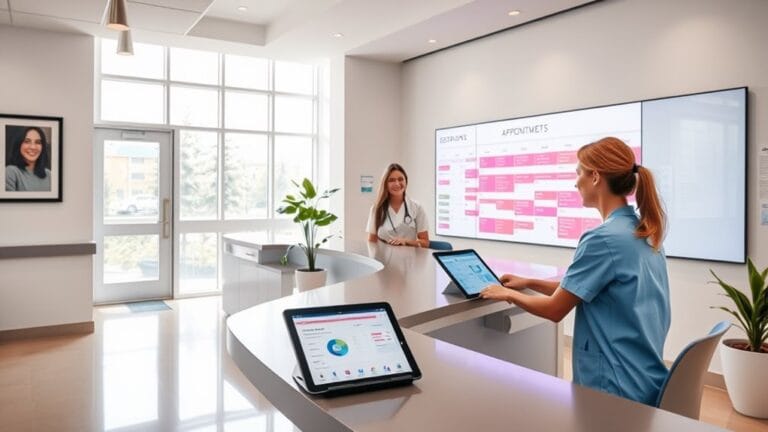7 Best Cloud Solutions for Modern Practice Management
You might think that adopting cloud solutions is too complex for your practice, but modern platforms have simplified the process considerably. These tools not only enhance efficiency but also integrate seamlessly with existing systems, making them essential for today's healthcare landscape. As you explore options, you'll find that the right solution can streamline operations and elevate patient care. Understanding the unique features of each platform can help you make an informed choice that aligns with your practice's needs and goals. If you need assistance navigating this evolving field, feel free to contact us. We can connect you with experts who can provide tailored solutions for your practice. So, which solutions stand out in this dynamic landscape?
Cloud-Based Practice Management Software
Cloud-based practice management software is revolutionizing how healthcare providers manage their operations. With its cloud accessibility benefits, you can access vital information from any location with internet connectivity, eliminating geographical constraints. This flexibility enhances operational efficiency and allows you to focus more on patient care rather than worrying about local server maintenance.
One of the standout features is its patient scheduling and appointment management capabilities. You can empower patients with robust online booking tools, automate reminders to reduce no-shows, and manage calendars effectively to optimize your schedule. These patient engagement strategies not only improve convenience for patients but also foster stronger relationships between them and your practice. Additionally, the seamless EHR integration ensures that patient records are directly accessible, further streamlining the management process.
Additionally, the software streamlines billing and revenue cycle management, automating tasks like claims processing and insurance verification. This guarantees accurate coding, optimizing financial performance while reducing administrative burdens.
Task and workflow automation further enhances efficiency by minimizing errors and freeing up time for you to dedicate to patient interaction.
In essence, cloud-based practice management software isn't just a tool; it's an all-encompassing solution that supports your mission to provide exceptional healthcare services.
EHR Integration Solutions
As healthcare evolves, integrating Electronic Health Records (EHR) into practice management systems becomes vital for improving patient outcomes. EHR integration solutions enhance data interoperability, allowing seamless data exchange across various platforms. This capability promotes coordinated care among providers, leading to better-informed decisions and ultimately improved patient care. EHR integration enables access to medical records across electronic software solutions, ensuring that healthcare professionals have the latest information at their fingertips.
By offering a unified view of patient data, EHR integration reduces errors associated with manual data entry, streamlining medication management and enhancing patient safety. Moreover, organized patient information boosts patient engagement, fostering higher retention rates as individuals feel more connected and informed about their health.
Adopting these solutions can also be cost-effective. By reducing the need for redundant storage and infrastructure, you can allocate resources more efficiently.
It's essential, however, to choose providers with experience in customized healthcare solutions and guarantee compatibility with your existing systems. Strong data security measures, including adherence to HIPAA regulations, will protect patient privacy during and after integration.
Patient Scheduling Tools
Effective patient scheduling tools are vital for streamlining appointment management in healthcare practices. By incorporating self-scheduling features, you enable patients to book, reschedule, or cancel appointments online, minimizing administrative workload and enhancing patient engagement. This convenience reduces the volume of phone calls and keeps your staff focused on providing quality care.
Automated reminders and notifications play an essential role in appointment optimization. Sending reminders via text or email greatly lowers no-show rates and keeps patients informed of any schedule changes. Customizable intervals allow you to tailor reminders to fit your practice's needs. Additionally, the integration of automated reminders ensures that your patients receive timely notifications, further enhancing attendance rates.
Calendar integrations and synchronization further boost efficiency. By connecting your scheduling system with Google or ICS calendars, you can prevent double bookings and manage multiple locations seamlessly. This guarantees real-time updates and accurate scheduling, making it easier for you to coordinate resources effectively.
Finally, the security, scalability, and support offered by modern scheduling tools guarantee HIPAA compliance and adaptability for practices of all sizes. With reliable customer support and predictable pricing, you can focus on what matters most—caring for your patients while maintaining a well-organized practice.
Billing and Revenue Management
Managing billing and revenue efficiently is essential for the financial health of healthcare practices. Cloud solutions offer significant advantages in this area, enabling you to streamline processes and enhance accuracy. With device accessibility, you can perform billing tasks from anywhere using any internet-enabled device. This flexibility supports real-time tracking of claims across multiple locations, which is vital for effective claim reconciliation.
Moreover, automation plays a pivotal role in improving operational efficiency. By automating tasks like claim submission and payment tracking, you reduce manual processes and free up valuable time for your team. AI-powered workflows further enhance accuracy, allowing for better revenue forecasting and informed decision-making. The RCM Cloud® platform, for instance, replaces resource-intensive billing processes with digital solutions that optimize your revenue cycle management.
Data security is a top priority in cloud billing systems. You can rest assured that sensitive information is transmitted and stored securely, adhering to HIPAA compliance. Frequent backups protect your data from potential disasters, ensuring continuity in revenue management.
In essence, cloud billing solutions not only lower operational costs but also empower you to respond swiftly to changing business needs, ultimately enhancing your practice's profitability and service delivery capabilities.
Embracing these tools is a step toward a more efficient and effective healthcare practice.
Staff Training Platforms
In today's fast-paced healthcare environment, leveraging staff training platforms is crucial for maintaining a skilled and compliant workforce. These platforms not only facilitate employee engagement through gamification and social learning features but also offer adaptive learning tailored to each individual's needs. This guarantees that your team members aren't just going through the motions but are genuinely absorbing the material. Additionally, many of these platforms, like Deel Engage, provide AI-driven talent management that enhances the training experience.
With extensive customization options, you can create a white-label experience that reflects your organization's branding and specific training requirements. Mobile and flexible learning allows your employees to access training on various devices, making it easier for them to balance their professional development with their daily responsibilities.
Real-time analytics provide actionable insights into employee progress, enabling you to identify skill gaps and measure training effectiveness efficiently. Additionally, integration with other tools like LMS and CRM streamlines operations, enhancing overall efficiency.
Automation and Workflow Optimization
How can automation and workflow optimization transform your practice management? By implementing process automation, you can greatly enhance workflow efficiency. Automating routine tasks frees up valuable time, allowing you to focus on strategic activities that better serve your clients.
With studies showing that around 60% of job roles have tasks suitable for automation, the potential to reduce human error and increase consistency is immense. Cloud automation transforms traditional IT processes, increasing business agility and facilitating rapid technology provisioning.
Using workflow management software, you can visualize and control multiple workflows with ease. Tools with drag-and-drop functionality help you create clear workflow diagrams, ensuring that each step is consistently executed. This streamlining allows your organization to scale operations without sacrificing quality.
Integrating with cloud infrastructure further optimizes your processes. Leveraging practices like continuous integration and continuous delivery (CI/CD) automates application deployment while reducing manual configurations. Public cloud services provide managed resources, which minimize the need for infrastructure management, letting you focus on your core mission.
Real-world applications, such as automated patient appointment scheduling in healthcare, exemplify the benefits of cloud-based solutions. By embracing automation and workflow optimization, you can enhance efficiency, improve decision-making, and ultimately serve your clients better.
Security and Compliance Features
Guaranteeing robust security and compliance features is essential for any practice leveraging cloud solutions. You need to prioritize data encryption to protect sensitive information at rest and in transit.
Implement multi-factor authentication (MFA) to add an extra layer of security beyond just passwords. Access controls, enforced through role-based access control (RBAC), confirm that only authorized personnel can access protected health information (PHI). Advanced security features are necessary to prevent unauthorized access and protect patient data.
Regular audits and detailed logging are important for monitoring access and activities, fostering accountability. You should also establish an incident response plan to swiftly contain and investigate any breaches, guaranteeing transparency throughout the process.
Compliance with regulations like HIPAA and GDPR is non-negotiable; make sure your cloud provider signs a Business Associate Agreement (BAA) and stays updated on regulatory changes.
Conduct regular risk assessments to identify potential vulnerabilities in your cloud storage. Backup procedures and disaster recovery plans are essential for maintaining data integrity and availability.
Frequently Asked Questions
How Do Cloud Solutions Improve Patient Communication and Engagement?
Cloud solutions enhance patient communication and engagement by utilizing secure messaging and patient portals. These tools enable easy access to health records and facilitate direct interactions, ensuring timely responses and fostering a more personalized healthcare experience.
What Are the Costs Associated With Implementing Cloud-Based Practice Management?
Implementing cloud-based practice management can feel like maneuvering a maze. You'll face implementation challenges and various pricing models, with costs ranging from subscription fees to training and support, all essential for a successful change.
Can Cloud Solutions Integrate With Telehealth Services?
Yes, cloud solutions enable seamless telehealth integration with EHR systems through cloud interoperability. This enhances real-time data access and streamlines workflows, considerably improving patient care and ensuring efficient healthcare delivery for everyone involved.
How Can I Assess the Return on Investment for Cloud Solutions?
To assess your cloud solutions' ROI, visualize a garden. Measure cloud cost benefits against performance metrics, tracking growth and efficiency. Keep an eye on expenses, savings, and overall impact to guarantee you're nurturing success effectively.
What Support Options Are Available After Implementation of Cloud Solutions?
After implementation, you'll have access to technical support for troubleshooting assistance, user training to enhance system usage, and avenues for gathering user feedback, ensuring continuous improvement and effective system performance tailored to your needs.
Conclusion
In today's fast-paced healthcare landscape, the right cloud solutions can transform your practice into a well-oiled machine. Imagine streamlining operations like a flowing river, where patient care is prioritized and administrative burdens are lifted. By integrating EHRs, enhancing billing processes, and ensuring robust security, you can not only reduce costs but also elevate the quality of care.
If navigating these innovative platforms feels overwhelming, don't hesitate to reach out to us for expert assistance. Our team can help you implement the best solutions tailored to your needs, saving you time and reducing stress. With our support, you can focus on what truly matters—your patients—while we help your practice thrive like a garden nourished by rain, blooming with efficiency and patient satisfaction.





